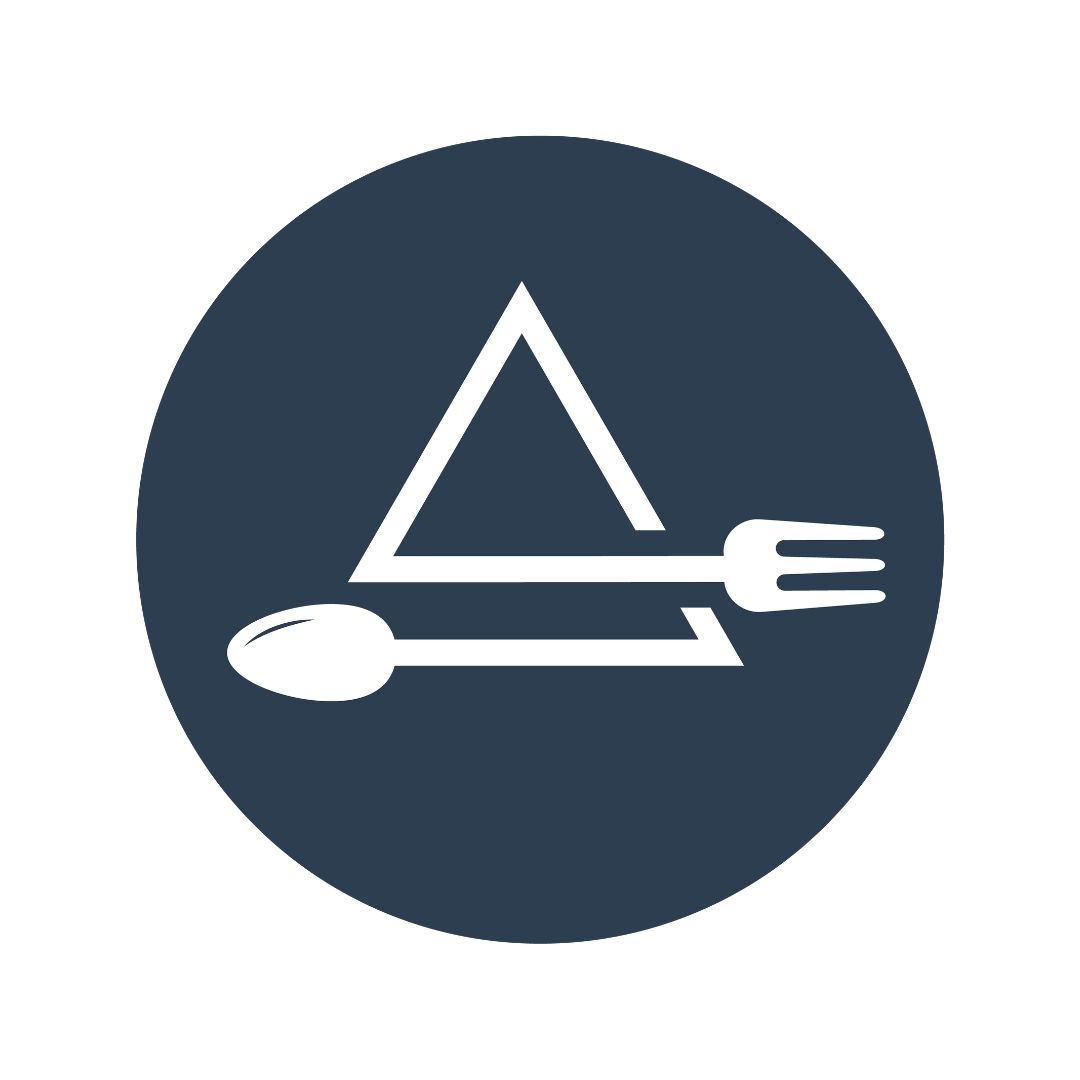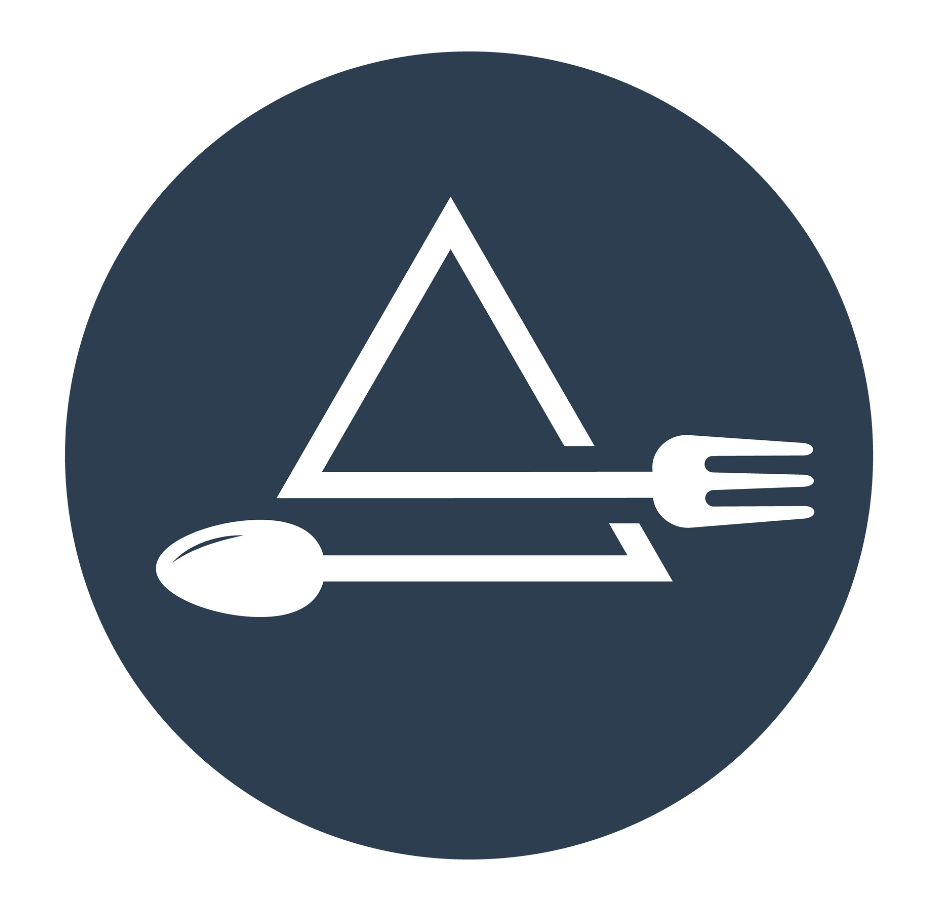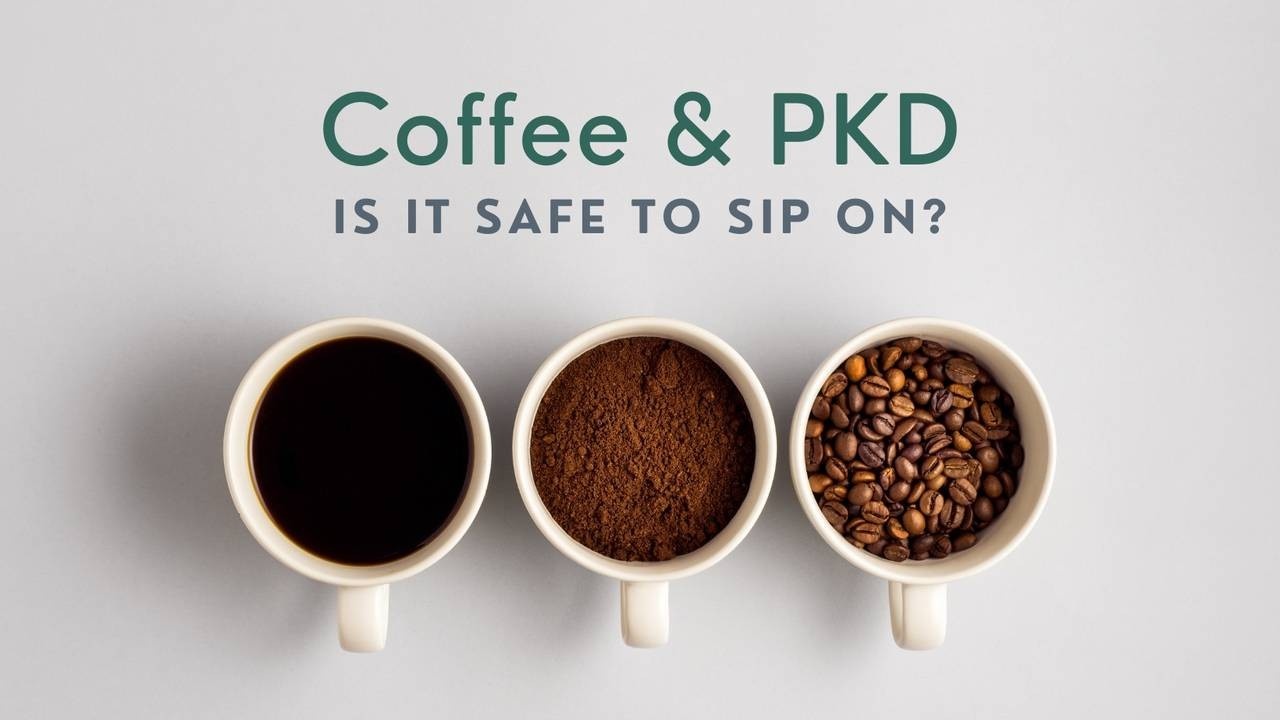
Coffee and PKD, is it safe to sip on?
Dec 15, 2022What have you heard, or been told, when it comes to drinking coffee with Polycystic Kidney Disease?
Perhaps that is harmful or can cause cyst growth. Or that consumption of coffee has no impact on PKD whatsoever. I get asked all the time if it's “safe” to drink coffee and if it will “hurt” PKD.
I get it, drinking coffee feels like a national pastime these days. Whether you enjoy the flavor and experience of sipping on a cup of coffee, or if you are looking to add a little pep in your step, stay with me to look at what research tells us, recommendations when it comes to how much, and a few questions to ask yourself regarding YOUR coffee intake and YOUR health.
What is Coffee?
Coffee is the third most popular beverage in the world, with water and tea claiming the top two spots (1). Coffee, because it contains caffeine, is considered a stimulant. It is traditionally a hot beverage, brewed by pouring hot water over ground beans. Beans that have been harvested from the fruit of coffee plants, have been dried and roasted, and then ground for brewing.
Coffee plants vary in size from small shrubs to tall, tree-like structures. The coffee we drink today can trace its beans' origins back to humble beginnings in Ethiopian Coffee Forrest. (2) This sounds like a magical place to a coffee lover like me!
Coffee and PKD
What Does Science Say?
When it comes to PKD and coffee, it isn’t the coffee itself that is “of concern”, it's the caffeine! Coffee is a natural caffeine source, one of the most commonly consumed sources worldwide.
The different amounts of caffeine intake, and their potential impact on PKD, are of interest and have been studied regarding Polycystic Kidney Disease progression and cyst growth.
Why? The theory is that coffee, because of caffeine, stimulates cyst growth and thus the progression of PKD.
Caffeine is known to stimulate a messenger in the body called cyclic AMP (cAMP). When stimulated, specifically in the kidneys, cyclic AMP is a known driver of cyst growth. With PKD, Cyclic AMP is a driver of cyst growth because, when activated in the kidneys, it leads to increased fluid secretion and drives cyst cell growth. It is part of the “Vasopressin Pathway”, click to learn more about PKD and vasopressin.
One of the earliest studies looking at PKD pathways & caffeine, by Belibi et. al, was published in 2002. (3) Human ADPKD cells, cultured in a laboratory, were exposed to different levels of caffeine and the impact on kidney cells was looked at. A mild increase in cyclic AMP was seen in the PKD cells.
The researcher’s conclusion was that caffeine increased cAMP and thus consumption was a risk factor for promoting cyst growth. The widespread recommendation to eliminate, or limit, coffee with PKD originated from their results.
It is worth noting that their conclusion is a hypothesis, and potential cyst growth was not tested or measured. Other studies, using preclinical animal modules, did not see the same results. These studies even administered higher doses of caffeine. (4)
Since these early studies, more work has been done looking at PKD, the kidneys, and caffeine. I want to highlight a few of them.
In 2019, Meca et. al published a paper that from what I can see, is the driving force behind the belief that “coffee causes cysts to grow”. (5) The goal of their work was to see if there was any relationship between caffeine, dose, and kidney size & function in mice.
Their conclusion was that high doses of caffeine are associated with PKD progression, greater TKV, and decreased kidney function. (5)
Are these results applicable to real life though? Not so much. The details are important to consider. The group given the highest amount of caffeine, 150 mg per kg body weight, was the only study group that showed a negative impact. The amount of caffeine that a human would need to consume daily to meet this is astronomically high. Dare I say almost impossible?
For example, a 150 lb person would need to consume about 10,200 mg of caffeine daily. This adds up to around 104 8-oz cups of coffee a day, consistently. Not feasible, and not applicable to real life.
A better question to ask is…Is there a level of caffeine consumption that does affect PKD progression?
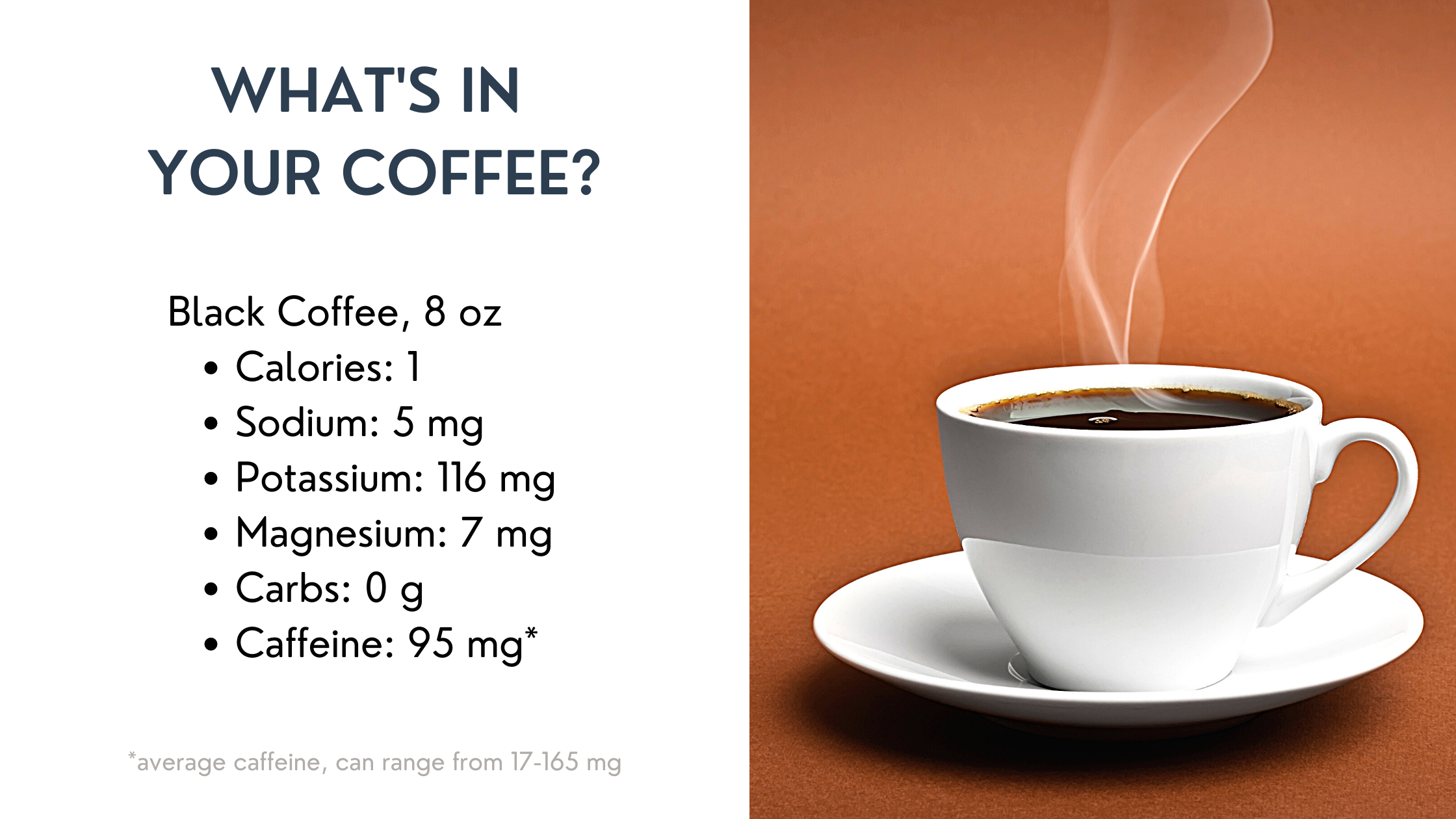
Caffeine and PKD
What Do Human Studies Say?
In 2012, Vendramini et. al published work that looked at ADPKD patients’ caffeine intake and found it wasn't directly associated with kidney size. (6) Worth noting, there are some shortcomings with this study’s design. One is the use of Ultrasounds for calculating an estimate of Total Kidney Volume (TKV), but also a smaller participant size.
What was interesting to me is that the participants with PKD had a much lower overall intake of caffeine when compared to the controls. Guess the widespread warning to avoid caffeine, and the fear around it was having an impact on the PKD Community!
A look back at the CRISP Study showed no significant relationship between caffeine consumption and the progression of PKD. Consumption was looked at regarding a potential impact on kidney size, the Total Kidney Volume (TKV), and measured kidney function (mGFR). There was no significant association between participants' reported caffeine intake and their kidney size and function. These “findings indicate that caffeine consumption is unlikely to have a clinically significant effect on ADPKD progression.” (7)
Results from the Suisse ADPKD study, a clinical study looking at the long-term effect of coffee consumption on ADPKD progression were published in 2018. (8) 151 ADPKD participants were followed in the Suisse ADPKD trial for around 4.5. years. Coffee consumption, and disease progression, were assessed at yearly visits. Kidney size, TKV, was the primary measure looked at but kidney function, GFR, was also taken along with other lab markers. Results showed that "coffee drinkers did not have a statistically significant different kidney size compared to non-coffee drinkers."(8) Two noted limitations are that coffee intake was self-reported and no other sources of caffeine we included. The researchers' conclusion was that the current recommendation to dramatically limit caffeine intake is weak and that "drinking coffee is unlikely to be a risk factor for disease progression in ADPKD patients." (8)
Does Coffee Have Any Perks?
Coffee, being plant-based, does have perks. It contains a number of vitamins, minerals, and antioxidants (that help fight cell damage and are protective). How it is grown, roasted, and brewed does impact the end amount.
Perks of coffee include:
- Contains moderate amounts of Vitamin B2 (riboflavin) and magnesium
- Caffeine can be a pick-me-up perk for many
- Minerals include potassium and magnesium
- Naturally low in sodium
- Numerous antioxidants
All of which likely contribute to the benefits associated with drinking coffee. (9) One 8-ounce cup of brewed coffee contains about 95 mg of caffeine. A "moderate" amount of coffee is generally defined as 3-5 cups a day, around 400 mg of caffeine.
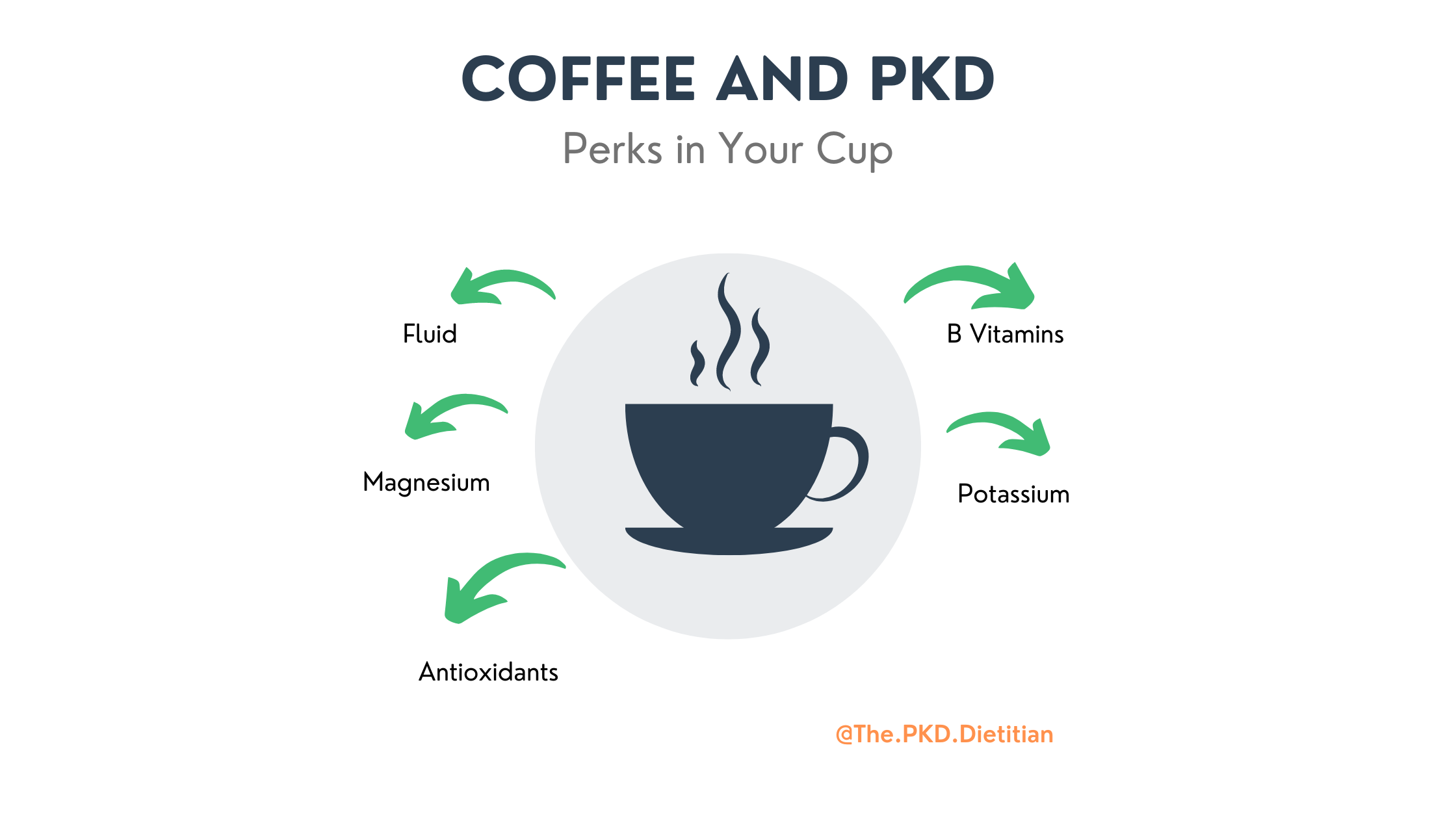
Does Coffee Count as Fluid?
A portion of coffee can be counted towards your fluid intake. After all, it is made with water!
Caffeine does have a mild diuretic effect, meaning it can cause increased urination, but that isn’t a 1:1 relationship. An 8 oz cup of coffee contains and counts for about 7 oz of fluid. Water is still your best hydration choice.
Potential Side Effects
The U.S. Food & Drug Administration (FDA) and General Dietary recommendations both recommended that caffeine should not be consumed consistently at > 400 mg of caffeine a day. This is considered a “high dose”.
Side effects of caffeine consumption can include:
- Insomnia
- Anxiety
- Irregular heartbeat
- Headache
- Stomach irritation
- GI distress
If you already have any of the mentioned concerns, for sure look at your coffee intake and assess if it is making matters worse.
Energy drinks potentially have very high amounts of added caffeine, up to 500 mg per serving. (10) I would absolutely avoid consuming these products. (11)
Coffee and Heart Health
The recommendation to be cautious about coffee and caffeinated beverages intake especially with cardiovascular disease and HTN, is a common practice. It isn’t right, it isn’t wrong.
How caffeine affects you is personal and partly due to your genetics. Your weight, meds, and any other medical conditions also come can impact how it affects you.
In an animal study from 1998, chronically high levels of caffeine did lead to higher blood pressure in animals with PKD. Interestingly though, no effect was noted on cyst development. Based on study results, the recommendation was made to limit intake to < 4 cups a day. (12)
Looking at the cumulative results of many studies together, moderate intake does not appear to be harmful to cardiovascular health. In fact, a reduced risk for type 2 DM, heart health, and some cancers have been found associated with moderate coffee intake suggesting a beneficial and protective effect. The cumulative research on coffee points in the direction of a health benefit. (13,14)
- Moderate Coffee intake is generally defined as 3-4 cups/day.
- Mild to moderate is 2-3 cups/day.
This is an 8 oz cup of coffee which an average of 95 mg of caffeine.
Not the much larger sizes we have become accustomed to from Starbucks and other coffee retailers!
Coffee Recommendations for PKD
KDIGO (Kidney Disease Improving Global Outcomes) recommends “avoid high intake” however, what a “high intake” is not defined. The PKD Foundation recommends “it make be wise to limit caffeine” with the limit set at 2-3 cups of coffee a day.
My thoughts are...
- 2-3 cups/day = 100% good to go.
- In general, stick under 400 mg of caffeine. That’s 4 cups.
- I am more interested in what you put in your coffee and coffee-like substances…
How caffeine affects you personally does matter.
Not sure what is a good amount for YOU?
Ask yourself these 3 questions
- Do I experience any negative side effects with coffee?
- Higher BP, feeling anxious, difficulty sleeping, upset stomach or GI
- If the answer is yes, check in with much you are actually drinking!
- What am I adding to my coffee? Lots of sugar? Fake-flavored creamer?
- Is my coffee taking the place of water?
If you answered yes to any of these questions it is worth exploring if coffee is serving you, if you are consuming more than you should or if what you are adding to coffee can be improved.
In Summary
- No evidence has been found in human studies that coffee consumption, because of its caffeine content, is detrimental to PKD nor that it promotes faster progression of cyst growth.
- Human studies haven't shown any significant effect on kidney function (GFR) or kidney size (TKV).
- How caffeine affects you personally and what you put in does matter!
- You can consume too much coffee/caffeine, aim for < 400 mg/day.
"Coffee - the favorite drink of the civilized world." - Thomas Jefferson
In Health,
Diana, The PKD Dietitian
